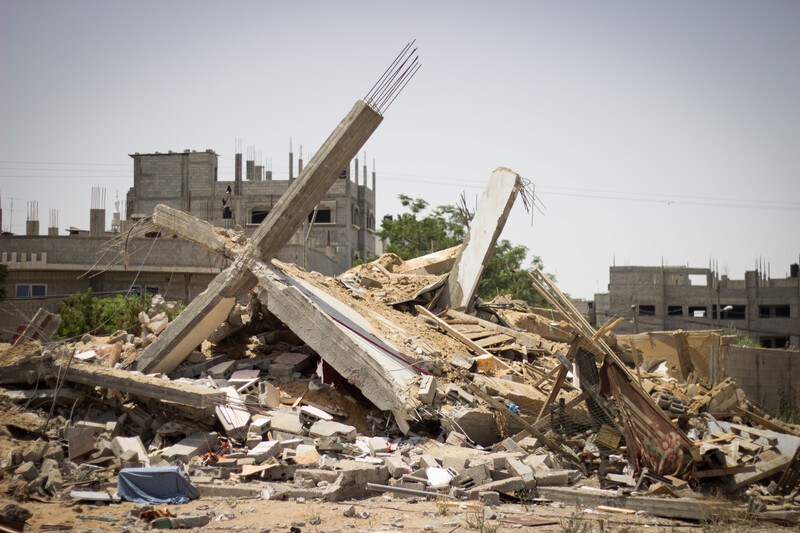The Electronic Intifada 31 October 2018

Israel has repeatedly used drones to cause large-scale destruction in Gaza.
ActiveStillsEurope’s coastal guards are examining whether Israel’s warplanes would be helpful tools in repressing refugees.
In September, the EU’s border management agency Frontex announced the start of trial flights for drones in Italy, Greece and Portugal. There was a major omission in the Frontex statement: the type of drones being tested have been used previously to attack Gaza.
Some details of the companies involved in these trials were published earlier this year. A “contract award notice” revealed that Israel Aerospace Industries was one of two bidders selected.
Israel Aerospace Industries is being paid $5.5 million for up to 600 hours of trial flights.
The drone which Israel Aerospace Industries offers for maritime surveillance is called the Heron.
According to the company’s own website, the Heron is “combat-proven.” That is code for saying it has been employed during Israel’s three major attacks on Gaza over the past decade.
Following Operation Cast Lead, Israel’s assault on Gaza in late 2008 and early 2009, a Human Rights Watch investigation concluded that dozens of civilians were killed with missiles launched from drones. The Heron was identified as one of the main drones deployed in that offensive.
Frontex – which frequently expels refugees from Europe – has been assessing drones for some time. Back in 2012, Israel Aerospace Industries showcased the Heron at an event organized by Frontex.
Through its flight trials, Frontex is enabling Israel’s war industry to adapt technology tested on Palestinians for surveillance purposes. While the EU’s representatives routinely profess concern for human rights, the involvement of weapons makers in monitoring borders bears more than a few similarities to the bellicose policies pursued by Donald Trump’s administration in the US.
Business opportunities
Israeli firms stand to benefit from decisions taken on both sides of the Atlantic.
Last year, Elta – a subsidiary of Israel Aerospace Industries – was hired to design a prototype for the controversial wall that Trump has proposed along the US border with Mexico. Elbit, another Israeli manufacturer of drones, was awarded a contract in 2014 to build surveillance towers between Arizona and Mexico.
The same companies have been pursuing business opportunities in Europe.
Elta has been in contact with various governments about its “virtual border patrol” system – which is based on the interception of mobile phone communications and snooping on internet users. To provide a pretext for such intrusion, the company plays the politics of fear. Amnon Sofrin, an Elta representative who was previously a senior figure in Israel’s spying and assassination agency Mossad, has advocated that Europe should prioritize “security” over civil liberties.
The Israeli firm Magal Systems is similarly eyeing contracts in Europe. Magal installed what it calls a “smart” fence – complete with sensors and advanced camera equipment – along Israel’s boundary with Gaza.
Saar Koush, until recently Magal’s CEO, has argued that the company’s role in enforcing a siege on Gaza’s two million inhabitants gave it a unique – or at least rare – selling point. “Anybody can give you a very nice Powerpoint, but few can show you such a complex project as Gaza that is constantly battle-tested,” Koush has said.
Learning from Israel?
Frontex has liaised with other Israeli firms.
In June this year, the EU published a notice showing that the Israeli company Windward has been awarded a contract worth nearly $1 million for work on a “maritime analysis” project run by Frontex. Gabi Ashkenazi, a former chief of Israel’s military, is an adviser to Windward; David Petraeus, who commanded US troops occupying Iraq and Afghanistan, is one of its investors.
In its 2016 [annual report] (https://frontex.europa.eu/assets/Key_Documents/Annual_report/2016/Annual…) Frontex stated that the “first steps” had been made towards developing “strategic” relations with Israel. Frontex has subsequently expressed its intention to increase that cooperation between now and 2020.
One focus is “mutual learning.” More than likely, that is a euphemism for swapping notes about which tactics should be used against people fleeing poverty or persecution.
Israel has an appalling record of treating refugees. Africans living in Israel have been subject to racist abuse from the very highest levels of government. Benjamin Netanyahu, the prime minister, has labeled them “infiltrators.”
Another government minister has insisted Africans cannot be considered as human.
According to the polling agency Gallup, Israel is one of the world’s least accepting nations for refugees. Despite its geographical proximity to Syria, Israel has refused admittance to victims of its ongoing war.
Last year, Netanyahu was heard telling leaders from the group of countries known as Visegrad Four – Hungary, Poland, the Czech Republic and Slovakia – that they should close their borders to refugees. He argued, too, that Israel plays an important role in reducing migration to Europe and implied that Israel should be rewarded for doing so.
The identification of Israel as a partner for “strategic cooperation” by Frontex is worrying in itself. The preparations to use Israel’s tools of repression against refugees sailing towards Europe are even worse.
Mark Akkerman is a researcher with Stop Wapenhandel (the Dutch campaign against the arms trade) and the Transnational Institute. He is the author of the reports Border Wars and Expanding the Fortress.

